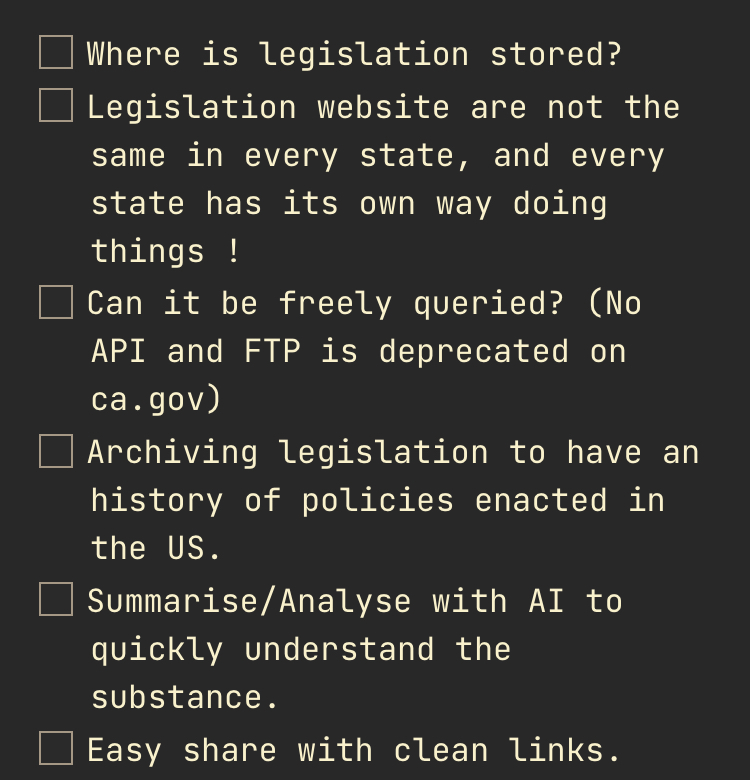I’m trying to get accustomed to writing asynchronous/concurrent Rust or any language!
I just want to build software that helps people, and hopefully makes friends along the way.
I have a temporary dream (as in we’ll see how long this lasts…) of building a database of legislation by state that can easily be queried.
I think a lot of people rely on the news to tell them how to interpret legislation when it’s actually really easy to figure it out for yourself if you know where to look. And with the proliferation of AI, it should be even easier to know what legislation is without some political analyst with an agenda.
Anyway, the idea is to have all this available on one website that uses open source code for the underlying database.

That would be a great project indeed… just a heads up:
I was part of a group exploring to do something similar a couple decades ago. The main problem we found, was dealing with those first two points: by the time we figured out all the places a single “state” (this wasn’t in the US) stored all their legislation, they had already changed some of them. We realized that it would take either: collaboration from the government in terms of standardizing how they store things… or a constant game of chasing around the changes they made. At the time, we concluded it wasn’t practical to do it for free, and indeed some paid services have emerged offering something similar, but they’re not open.
My suggestion: if you managed to find a way for governments to make legislation accessible in a standardized way, that would be a HUGE success. Ideally, have it written into constitution, and/or use the constitution to beat government bodies into compliance.
Also a warning: the messy state of things, seems to be a sort of “job security” for some lawyer firms and companies offering the consolidation services, so taking that away may not be easy.
…that’s freakin’ cool!
This could really be an amazing project! I’ll see what I can do!
I’ve also wondered if it’s possible to somehow hook git into legislation. To track changes like how laws are amended and superseded and so on.
Law has a lot in common with software and is constantly being improved by a large number of people.
Added to the list ! That’s such a clever way of tracking law history !
it’s actually really easy to figure it out for yourself if you know where to look.
Yeah, but different people interpret legislation differently, and the gramatically literal interpretation isn’t always the “right” one. So it would be smart to also include links to any cases or precedents based on them.
Google Maps replacement with local bus, transit, bike path navigation integration would be pretty sweet to see as a FOSS Rust app
@recursive_recursion there’s Organic Maps that does this but there are no options for my city.
The biggest problem with Organic Maps is that it doesn’t have the bus routes for the city I live. Otherwise, yeah, I support it.
Organic Maps currently only supports metro/subway navigation, not buses, trains or other types of PT (although they are planning on introducing a new map layer for that). Bike routing works, although only fully separated bike paths are rendered.
@JohnDumpling oh, I see. I thought only my city was not supported. OsmAnd does have on the ground transit routes though. And there’s also Transportr and Offi, but they do not support all the cities (and clearly not bike paths).
I’d like a FOSS equivalent to Google Pay, but I understand it’s more complicated than just writing an app.
Why not use F-Droid?
Not Google Play, Google Pay. The NFC payments app.
Oh sorry I’m dumb. You could copy the NFC chip of your bank card on an open-source app on your phone. Maybe it would do the job?
I have no idea how to do that. Is it something you’ve done before?
I looked at how to do that it is not that easy… the banking system is so closed :(
A book/movie/object collection shelf app that has barcode scan, ISBN search, and custom database entries like money spent. They were really popular in the early 2010s but mostly subscription based and Mac only. I could probably repurpose something like Calibre to do similar things but that’s a bit overkill and a lot of non-book entries would take too long to setup.
Background:
I use Obsidian for journaling and knowledge management. Each page is saved as an individual .txt file rather than in some database which ensures continuity of my data even if I switch applications one day.
I sync the files between my devices using Syncthing. Some of my notes are collaborative with others: by sorting my notes into specific folders and syncing select folders to select devices I have a notes library with a mix of personal and shared notes.
Syncthing is good at managing file conflicts. It surfaces the conflict and lets you select which file should remain. It also has options for very good versioning control.
Answer:
So, to your question, I would love to contribute to Syncthing to provide an optional capability to merge content from two conflicting .txt files rather than selecting one or the other. This would greatly improve the collaborative experience when using Syncthing to manage notes in Obsidian or similar applications.
I think there are a not-insignificant number of people who could get value from this. Syncthing is written in GO, and I’ve never contributed to an open source project before. I’m looking forward to giving it a shot but if someone else starts first that’s just fine with me. :)
Maybe you want to do that in collaboration?
I’d like a functional local LLM app for Android. I tried MLCChat, but it just spat out gibberish. I tried installing llamafile on a Linux VM with Termux, but it didn’t work.








